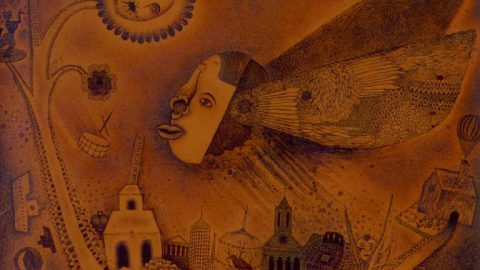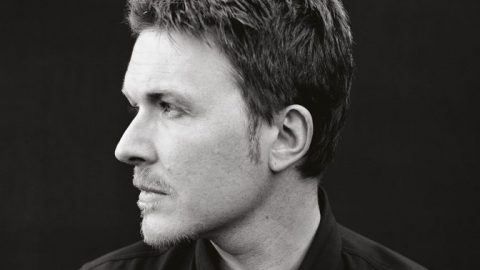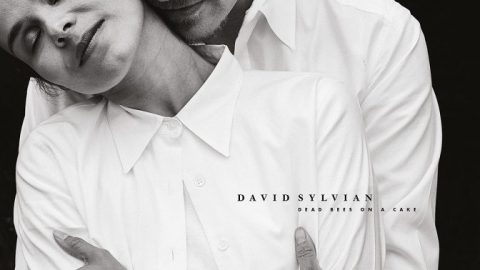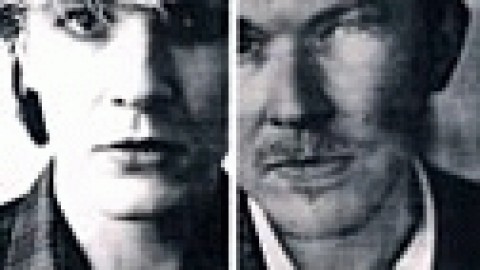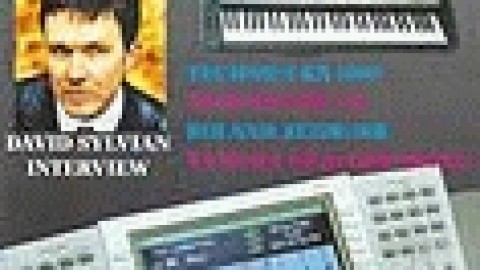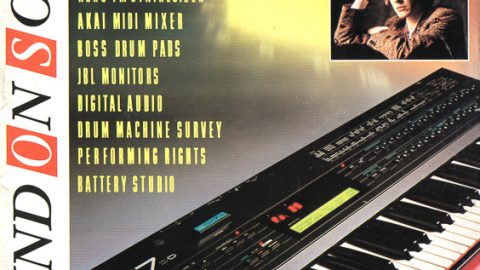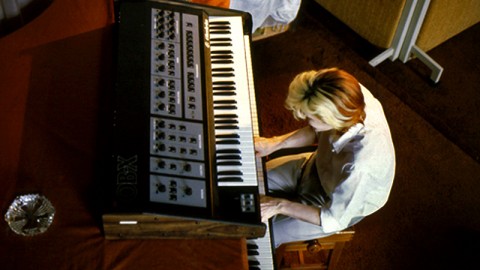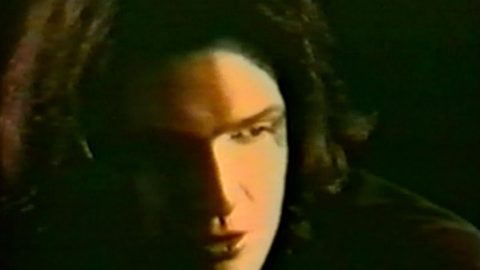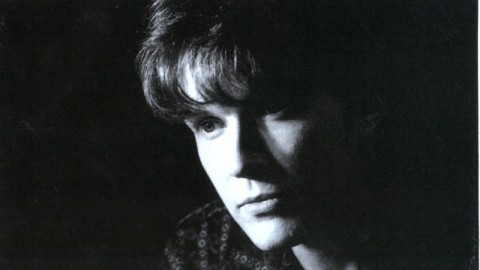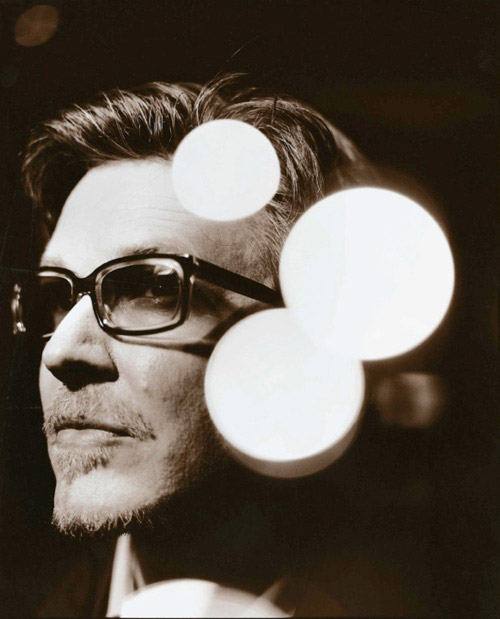
David Sylvian Interview – WDET-FM, Detroit, MI, USA (4.14.99)
Transcript by Mark Shanahan
WDET: David, the last time I saw you – was a while back – you were playing a show in Chicago, along with Robert Fripp. It was really a memorable collaboration and a memorable concert – at – what’s that club called – I think ‘Park West’ it’s called – in Chicago.
DS: Uh-huh
WDET: Can we go back a few years, first of all – and talk about your collaboration with Robert Fripp? That was really about the last time we heard from you, at least on CD. How were your feelings when you finished working with Robert Fripp – was it a good experience?
DS: There’s always something to be taken from collaborative work – on a number of levels – regardless of the success or otherwise – of the project itself. Working with Robert was quite an experience. I got a lot out of the collaboration – in the context of live performance particularly. The beginning of the collaboration started as a tour of a trio – Robert Fripp, myself and Trey Gunn. We convened two weeks prior to the start of the tour, in my home in London and wrote material together for about a week. The second week we rehearsed it and then we were out on the road performing it, so a great degree of concentration and focus was necessary to keep everything intact (laughs) – you know; to stop it from falling apart. Because it was still — obviously taking form – during that period of being out there on tour. It was evolving, as time went on, and there was quite a challenge. I think it was the degree of concentration, focus that we had to bring to the performance each night that allowed me to immerse myself in the performance – more so than in the past – in terms of live performance – and enabled me to enjoy the context of live performance a great deal more than I ever had. I got a lot more out of it. And also influenced by Robert’s degree of focus that he would bring to the performance night after night. He – there’s a tremendous amount of commitment brought to a performance each night with Robert. It’s something I hadn’t experienced to that degree before. So that was a wonderful experience. We went on from there to record an album together in the studio, which was a difficult time for both of us, actually. Both going through enormous upheavals in life and the album reflected that to some degree. In a sense I was working within a context of Robert’s making – in that he selected the musicians and it was an interesting provocation. It allowed me to express certain emotions and themes that had been absent in my work to a large degree in the past. So, I could deal with themes such as anger, frustration, anxiety – that I’d been feeling for a number of years – and hadn’t found the right context in which to express them. And, this afforded me that opportunity. But it wasn’t necessarily an easy album to make. Following on from there, we toured together one more time and that, again, was a great experience.
WDET: And how are you feeling these days — as far as your personal life. You talk about there being a lot of upheaval in your life at that time. Do you feel more settled right now? Happier right now?
DS: Oh, for sure – yeah. A lot of changes took place – just during that period where Robert and I started talking about working with one another again. I was – I’d been through a rather intense period in my life. It had been a period of about three to four years and I’d begun to see light at the end of the tunnel when I came to work with Robert. Which is why I was able to deal with this rather negative subject matter in a positive way, in that there was a resolution to it. So, it was a cathartic experience in some ways. At that same time, I met my wife-to-be, Ingrid and everything began to shift at that point. So, I made a move to the States and set up home in Minneapolis for a number of years. I had two beautiful daughters – and everything has turned around. It’s been a very rich, eventful – joyful period in my life, you know; it’s been a really wonderful period.
WDET: And what has been the biggest learning experience for you since – say – becoming a parent? What has it taught you?
DS: Gosh, it’s so rich, you know I mean — all the clichs are true; that the level of love – that unconditional love – that you feel for your children is tremendous – to have relationships as rich as that in life. I mean, the influence is immense. But it is also quite a challenge, being a parent and I think it enables you to see the positive and negative aspects of your own nature – in the way that you respond to your own children. That allows you have a greater understanding of where you need to work on yourself. To improve yourself – as a parent, as a person. That is often the case with close relationships in life anyway, but I think it’s magnified to such an intense degree – in your relationship with your children.
WDET: Hmmm. How did you meet your wife, Ingrid – Ingrid Chavez?
DS: Well, it was a strange set of circumstances, really. She was on tour in Europe, promoting her album at that time and
WDET: One that we played a lot here at WDET.
DS: You did?
WDET: And still do – oh, yeah.
DS: Well, good for you. Well, she was asked on numerous occasions by journalists who she’d like to work with in the future and my name came up from time to time. She was in Paris, and my name came up again in discussion with a journalist – and he happened to know me. He said, well I can arrange an introduction when you go through London, which she was about to do. She came to London, I happened to be in Paris at the time, so we never met. But, she left a CD and a note for me, which I picked up on my return. Now, prior to flying to Paris to work with Hector Zazou, I’d written a track with Ryuichi Sakamoto called ‘Heartbeat’ and I’d written a section in that piece of music for spoken word, female voice. And, I hadn’t decided who would be the right person for the role, so it was this synchronicity that there was this album waiting for me. And, as soon as I heard it, the voice was entirely appropriate for the composition I’d just completed. And, this allowed us to meet and it went on from there. I mean, within two weeks of being in each other’s company, we were inseparable.
WDET: Hmm.
DS: It was a wonderful meeting. There was a whole series of circumstances and events that surround that, which I won’t go into, but it was a a very fortuitous set of circumstances that brought us together.
WDET: And so, are you still living in Minneapolis now, or are you on the west coast?
DS: I’m on the west coast. Yeah – I’m living in wine country, north of San Francisco.
WDET: Oh, that sounds nice; that sounds really pleasant.
DS: It is a very beautiful environment, yeah – it’s lovely.
WDET: When you first moved to America – was that a shock, was it a difficult period of adjustment?
DS: It wasn’t necessarily that difficult; it took me a while to let go of certain ties to Europe. But, at the same time I saw the move to Minneapolis as something of a retreat. There was an intensity to my life in England that was unworkable and I decided to move – to leave the country anyway, prior to meeting Ingrid. I just hadn’t foreseen America being my future home. But, when we moved to Minneapolis, yeah – I cut a lot of ties – I mean that cultural overload that I’d been experiencing was done away with entirely and certain social circles were – I withdrew from. So, it became something of a conscious retreat, and you have these long winters in Minneapolis; it allows you to focus very much on your immediate environment – the family. I found that very rewarding. Maybe for the first time in my life I had nothing to do with the industry as a whole and the media at all and I just nobody was that intrusive to any great degree, but just having no contact with it whatsoever was quite refreshing. And just being able to focus on family life to that degree – and we built a studio in the attic of the home, so the music was born out of this very loving environment; it was wonderful.
WDET: When did you first start writing material for this album? I know you spent quite a long time recording it – how far back do some of the songs go, David?
DS: I think some outlines for a number of pieces were drawn up in maybe as far back as ’93/’94. And, that’s because initially I started writing with Ingrid – we were sketching out the possibilities for a musical collaboration. I would write pieces that I felt would appeal to her as a writer and some of those pieces had a slight r & b leaning to them. We completed a number of pieces together, prior to our first daughter being born when, for obvious reasons priorities and focus shifted. When it came time for me to write my album, I found a number of these pieces that she hadn’t had time to look at or focus on or address and I adapted them for my own use. One of the pieces was what became ‘I Surrender’, which is obviously a very pivotal piece on the album. I think that – the nature of that piece influenced some of the subsequent writing. Which is very interesting for me; in a sense, I’d written a piece of music that I thought would appeal to my wife and inspire her as a writer, but ultimately it inspired me and influenced the musical direction of the album to some degree.
WDET: Where does the title of the album come from? I mean, one of your previous albums was called “Secrets of the Beehive’. What is the theme of bees and dead bees on a cake? What is that supposed to have a specific meaning or just evoke something different in different listeners or what?
DS: Well, the metaphor of the bee has changed over time – in the way that I’ve used it. The title came up during the writing stage of the album and it appealed to me greatly. Just this very mundane image, but I didn’t really understand its significance in relation to the work. That came later, when I began to see the the main themes that were running throughout the work – which, for me – were love, devotion, and, ultimately, divine intoxication. And often, the goal laid out on the spiritual path is this notion of the death of the ego merging with the object of desire – and the bee became a metaphor for the ego – or the death of the ego. It was an oblique reference, a humorous reference and, as I said, a rather mundane one, but it appealed to me greatly and I couldn’t it became so much a part of the album that I never questioned it as the title.
WDET: You, as always on your releases, have surrounded yourself with a truly amazing set of musicians. I’m talking about people like Bill Frisell and Marc Ribot and Kenny Wheeler. Can you talk about what guides you when you are thinking about what musicians you want to work with on your album. Specifically, this one. Are you more interested in a person’s personality sometimes, than their actual playing? What guides you in these decisions?
DS: Well, once I’ve written a piece of music, during the arranging of that composition; it’s the arrangement itself that will cry out for certain voices. Those voices are obviously within my frame of reference, so I’m making a connection between a body of work that appeals to me, that I relate to in some way, and a particular composition. And then it’s a matter of bringing that musician in to see if they can similarly make a connection of some kind. And more often than not it works and this is just the way I’ve worked since ‘Brilliant Trees’, really – I guess – was the starting point for this method. I guess, initially when Japan broke up in ’82, I was a little worried as to how I was going to progress in that sense – working with different musicians. I was very worried about working with studio musicians – in that – they spend their lives moving from one session to another – being perfectly proficient players, but not having and emotional commitment to the work in some way. And I desperately desired that in the musicians that I worked with so, this method of making connections between particular compositions and bodies of work started to come about quite naturally. And, ultimately, I’ve ended up with more committed performances as a result – these are very unique players that, when they come to a work and working with Ribot for the first time was a wonderful example. We only worked for one afternoon together, but in that afternoon he gave me an enormous amount of work to deal with and, not only is he a wonderful player, but he is a remarkable listener. His response to the work was entirely apt. In fact, he ended up playing on a lot more material than I originally had him marked for. So, that was – that kind of experience was/is rare, but makes the whole process worthwhile, you know – that moment of collaboration – of meeting on common ground, finding common vocabulary is really remarkable.
WDET: There are a couple of songs on “Dead Bees On a Cake’ that contain samples. I’m thinking of ‘Midnight Sun’, which I think samples a John Lee Hooker tune?
DS: That’s right.
WDET: And then on ‘Pollen Path’, a composition of John Cage’s is sampled. I’m particularly interested in the John Lee Hooker sample. One might not associate you with being, you know – a blues fan. How did that come about?
DS: Well, there’s – before I start writing material, I tend to spend a period of time either creating sounds on synthesizers, creating a library of sounds, creating a library of samples. And, this was the case in this instance. I’d taken a sample from a John Lee Hooker track and I started working with it, at the latest point in time. Initially, it was for the fun of it, because it was a genre of music that I’d never touched upon an area of music that I didn’t think it would be appropriate for me to delve into. But, as I played with the idea further and further – and came up with this something of a hybrid, it appealed to me more and more. Through working with the blues as a writer, it just opened up that world to me to a greater extent — as a listener. But, it was the notion of a hybrid that interested me – bringing in – I mean, first of all – my voice – within the context of this blues track was interesting but, then bringing in other elements. Such as Ribot, such as the kind of Gil Evans style brass arrangement and so on and so forth. So, I was trying to bring something to it, something to the blues that I’d never heard before. And, then that pushed me on and enabled me to take it on a far more serious level.
WDET: I think I read in – somewhere, that you were quoted as saying, ‘All of my albums are incomplete in some respects.’ Could you talk about that aspect of your work a little more? It somehow reminds me of a piece of art by the artist Marcel Duchamp – his large glass, which he deliberately left incomplete. DS: Mmm – hmmm. WDET: Are you a fan of his work?
DS: Yes.
WDET: Did that inform your work at all?
DS: I don’t think it informed my work, no. Because it sometimes the level, the degree of incompleteness of a work isn’t – isn’t desirable (laughs); it’s the circumstances it was created in that allowed it to be that way. I mean, with this album, I was able to see the work through to a point of completion that I hadn’t been able to with past solo work. In that, there were no restrictions; there wasn’t time constraints or financial constraints. I could just keep working on the material until I felt I’d taken it as far as I felt I could (at this point in time). In the past, that’s not always been the case. ‘Gone to Earth’ is — I feel is incomplete. ‘Beehive’ is certainly incomplete – the pivotal track that the album was built around was never finished. So, I actually had to rethink the album, before I could put it out; there was no more money to allow me to complete the project, it had to go out as it was, so But, having said that, the notion of leaving a composition somewhat ‘open-ended’, allowing there to be enough room for interpretation on the part of the listener is very important to me. And, despite everything that was said about the making of this album, it would disappoint me to think that people will come to the work, viewing at as purely autobiographical. It would limit the power of the work; the effect the work would have on them. It is important for me that they can interpret the work and it become relevant to their own life and enrich their own life to some degree – that’s the real aim.
WDET: Here’s just a quick question – and maybe a banal one, but so many people wanted me to ask you this, David Sylvian: are you going to be doing any touring in support of ‘Dead Bees On a Cake’?
DS: I’d like to very much, but I don’t think it’s going to happen in the short term. I’m thinking maybe the beginning of next year, as there are a couple of other projects I’d like to complete prior to getting on the road.
WDET: And what are those?
DS: I’d very much like to produce an album for Ingrid. That would be the next step and I have a compilation album to put together, which Virgin have been asking for — for a number of years now and I’ve been putting it off. But, now seems like an appropriate time to create an overview of the work from – let’s say ’82 on. And maybe bring some of these pieces that weren’t completed at the appropriate time to be included into the recordings of that time – into this, into the new context of the compilation album. And, so there are some very beautiful pieces that may finally see the light of day. So, once I have those two albums completed, it would allow me to undertake a tour that would be in support of ‘Dead Bees’, the album with Ingrid and something of a retrospective as well. And, having the family with me on tour would allow me to undertake a tour of greater duration than I would otherwise be able to do.
WDET: I just want to ask one final question. Your lyrics have always been deeply personal and there always seems to be a lot of deep introspection and a searching toward happiness and contentment and spirituality it sounds like you really have found that, judging from the lyrical tone on your new album. Are you a religious person — in any type of conventional sense? Or unconventional sense? (both laugh ) None of the above ?
DS: I have a practice that informs my life, yeah and that’s informed by aspects of Buddhism, particularly Zen and Hinduism, so that is something that I found to be very necessary in my life and enriches it on a whole number of levels – and, therefore finds its way into the work on some level. It’s been a search that’s been ongoing for many, many years and I feel fortunate, over the past five years or so, to have increased that aspect – the activity in that aspect of my life a great deal – and that’s enriched it further.
WDET: David Sylvian, it’s always a real pleasure to have a chance to talk to you. Congratulations on ‘Dead Bees On a Cake’. We’ve been waiting for new music from you for a long time and it has definitely been worth the wait. Best of luck to you and your children and your wife, Ingrid. Thanks for talking to us at WDET this afternoon.
DS: It’s been my pleasure, thank you very much.
WDET: Very good; take care.
DS: Bye-bye now.
WDET: Bye-bye.

